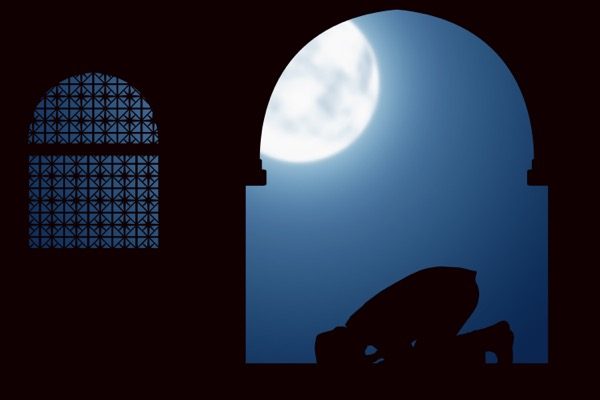
Mirza Kaleem Ahmad, Virgina USA
Since time immemorable, humans have been in quest to understand whether there is a Creator of this universe or not. Does this universe just exist by itself or was it created by a supernatural being we call God? History illustrates that various religions have presented their own concept of God, while Atheism, in the broad sense, presents an absence in the belief of God. Several thinkers and philosophers have given their own views and arguments either for or against the existence of God. Thales of Miletus (624-546 BC) [1] was a Greek philosopher and mathematician. Thales posed the independent pre-existence of God from all eternity, stating that “God was the oldest of all beings, for he existed without a previous cause even in the way of generation.” Sir Isaac Newton (1642-1726) an eminent mathematician said, “We account the Scriptures of God to be the most sublime philosophy”. [3] Diagoras of Melos (5th century BC) was an ancient Greek poet known as the Atheist of Milos, who declared that there were no Gods. [4] Epicurus (341-270 BC) was an ancient Greek philosopher who adamantly rejected the idea that deities were involved in human affairs in any way. [5]
For the human mind of ancient times and middle ages, it was quite difficult or even impossible to comprehend the magnificence of the Creator without understanding the complexity, grandeur, and vastness of its creation. In modern times with scientific tools, such as astronomy, we now have just begun to understand the vastness of the universe and with advances in biology and medicine the complexity and functions of a human body. If you talk to an expert in any of these fields of science, they will acknowledge that the collective knowledge of humanity is still at its infancy stage and we are just skimming the surface.
So, is it possible to prove with one hundred percent certainty that God exists and if He exists then what are His attributes? Mirza Ghulam Ahmad (as), also known as Promised Messiah (13 February 1835-26 May 1908) was a religious leader in British India and the founder of the Ahmadiyya Movement in Islam. He claimed [6] to have been divinely appointed as the Promised Messiah. Ahmad (as) profoundly addresses this question in his writings;
“Reason and logic can only go so far as to show, on the basis of the consummate and wise order of the universe, that the heavens and earth must have a Creator, but they do not go so far as to prove His actual existence; and the difference between ‘should be’ and ‘is’ is plain enough.” [7] [Lecture Lahore page 22]
“As the Being of God Almighty, despite its brightness, is hidden beyond sight, the physical universe is not adequate for its true recognition. This is the reason why those who depended upon the physical system despite their careful consideration of its perfect orderliness which comprehends hundreds of wonders within itself, and despite their pursuit of astronomy and physics and philosophy to a degree which shows that they had penetrated through heaven and earth, could not get rid of their doubts and suspicions and became involved in all types of errors and wandered far afield in their absurd fantasies. If they thought of the Being of the Creator, they proceeded only thus far that observing the great orderliness of the wise system they imagined that it should have a Creator. It is obvious, however, that this idea is incomplete and this understanding is imperfect, for to say that this system needs a God is not equal to saying that God in fact exists. This was only their conjectural understanding which cannot bestow satisfaction and contentment upon the heart, nor can it entirely remove doubts. This is not a cup which could quench the thirst of complete understanding which is inherent in man’s nature. In fact, such imperfect understanding is very dangerous, for after a great deal of noise it leads to nothing.
So long as God Almighty does not affirm His Existence by His word, as indeed He has done, the mere observation of His handiwork does not afford satisfaction. For instance, if we see a room which is bolted from inside, our first reaction would be that there is someone inside who has put up the bolts for it is impossible to put up the bolts from outside. But if over a long period no one from inside should respond to repeated calls, we would have to abandon our assumption that there is someone inside and we would imagine that there is no one inside and that the bolts have been put up through some clever device. This is the case of the philosophers whose understanding does not go beyond the observation of God’s work. It is a great mistake to imagine that God is like a corpse which has to be brought out of its grave by man. If God has to be discovered through human effort, all our hopes of such a God are vain.
Indeed, God is the Being Who has ever called mankind to Himself by announcing: I am present. It would be impertinence to imagine that man has laid Him under an obligation through his understanding of Him and that if there had been no philosophers, He would have remained unknown. It is another impertinence to enquire whether God has a tongue wherewith He can speak. Has He not created all heavenly bodies and the earth without physical hands? Does He not see the whole world without physical eyes? Does He not hear us without physical ears? Was it then not necessary that He should also speak?
It is not at all correct to say that all God’s speaking has been left behind and that there is nothing in future. We cannot seal up His words and His speech in any age. Without doubt, He is ready to enrich the seekers from the fountain of revelation as He used to do before. The gates of His grace are as open today as they were at any time. It is true, however, that the needs for law and limitations having been fulfilled, all Messengerships and Prophethoods found their perfection at their last point, which was the person of our lord and master, the Holy Prophet [peace and blessings of Allah be on him].” [8] [Islami Usul ki Philosophy, Ruhani Khaza’in, Vol. 10, pp. 363-367]
Therefore, in order to reach the level of certainty beyond what human knowledge, logic and reasoning can reveal about the existence of God, one must look towards the Creator for help. Can God talk to mankind? Can He reveal His existence by communicating to mankind? Indeed, He does through His Prophets. We will try to elaborate this point by the writings of Ahmad (as);
The God Who has manifested Himself to all the Prophets, and appeared to Moses on Mount Sinai and appeared to Jesus on Mount Seir and shone forth to Hazrat Muhammad, the chosen one [peace and blessings of Allah be on him] on Mount Paran, the same Mighty and Holy God has manifested Himself to me. He has talked to me and has said: I am the High Being to establish Whose worship all the Prophets were sent. I alone am the Creator and the Master and have no associate. I am not subject to birth or death. [9] [Government Angrezi aur Jihad, Ruhani Khaza’in, Vol. 17, p. 29]
Let us now examine the attributes and characteristics of God through His own words revealed in the Holy Quran.
“In the Holy Quran, God describes His attributes as follows:”
قُلۡ هُوَ ٱللَّهُ أَحَدٌ ٱللَّهُ ٱلصَّمَدُ لَمۡ يَلِدۡ وَلَمۡ يُولَدۡ وَلَمۡ يَكُن لَّهُۥ كُفُوًا أَحَدُۢ
Al-Ikhlas, 112:2-5
i.e., your God is One in His Being and in His attributes. No one is eternal and everlasting like Him, nor does anything possess attributes similar to His. Man depends upon a teacher for his knowledge, yet his knowledge remains incomplete, but God needs no teacher, for His knowledge knows no bounds. Man depends upon the air for his hearing which is limited, but God’s hearing is inherent and unlimited. Man depends upon the light of the sun or other sources of light to see, and his sight is restricted, but God sees by His own light and His sight encompasses everything. In order to create, man is dependent upon matter and requires time, and his power of creation is confined, but God’s power of creation is not dependent upon matter or time, nor is it in any way limited. This is because all His attributes are unique like Himself, and if even one of them was flawed, they would all be considered flawed. His Unity cannot be established unless He is seen to be peerless both in His Person and in His attributes.
In the final part of these verses, the Holy Quran says that God is not the son of anyone, nor does He have a son. He is Self-Sufficient and has no need of a father or a son. This is the Unity of God—which the Holy Quran teaches us.” [10] [Lecture Lahore page 11-12]
Ahmad (as) in his writings provides further commentary on this subject from the Holy Quran;
“The Holy Quran teaches us that, by virtue of all His excellences, God is One and has no partner. He suffers from no shortcoming. He comprehends all perfect attributes and manifests all holy powers. He is the Originator of all creation and Source of all grace. He is the Lord of reward and punishment, and everything returns to Him. He is near despite being far, and is distant despite His proximity. He is above everything, but we cannot say that there is anyone below Him. He is the most Hidden, but it cannot be said that anything is more manifest than He is. He is Self-existent and everything subsists because of Him. He sustains everything but nothing sustains Him. Nothing has come into being or sustains itself without Him. He encompasses everything, but we do not know in what way. He is the Light of everything in heaven and earth. Every light shines through Him and every light is a reflection of His Being. He is the Lord of the universe, there is not a soul that is not sustained by Him and not a soul that exists by itself. No soul possesses any power that has not granted by Him.
His favors are of two kinds. (1) Favors that are granted without any effort on the part of anyone. These have always been in existence, e.g., the heavens, the earth, the sun, the moon, the planets, water, fire, air, and all the particles of the universe that have been created for our sustenance. He provided for our sustenance even before we had come into existence, or had done anything to deserve them. Can one say that the sun or the earth was created on account of one’s deeds? These favors came into existence before man was created and have not resulted from any of his actions. (2) Favors that are bestowed as a result of people’s actions. These are too evident to require illustration. [11] [Lecture Lahore page 8-9]
Now the question arises that if God does exist how can one establish a relationship with his Creator? We again look towards the Holy Quran to address this.
“In the Holy Quran, God has given us the perfect teaching, which, if truly followed, enables us to behold Him in this very life. He says:
مَن كَانَ يَرۡجُواْ لِقَآءَ رَبِّهِۦ فَلۡيَعۡمَلۡ عَمَلٗا صَٰلِحٗا وَلَا يُشۡرِكۡ بِعِبَادَةِ رَبِّهِۦٓ أَحَدَۢا
Al-Kahf, 18:111
i.e., whoever desires to see God—the True Creator—in this life, should act righteously. His actions should be free from mischief, ostentation, conceit and arrogance, and should neither be defective, nor deficient, nor contrary to one’s personal love; and should instead be imbued with sincerity and faithfulness. He should also abstain from associating partners with God and should worship neither the sun, nor the moon, nor the stars, nor air, nor fire, nor water, nor anything else. He should also not put his faith in the physical means as though they were God’s partners. Nor should he depend upon his own prowess, for this also amounts to idolatry. Having done everything in his power, he should consider it of no consequence and should not pride himself on his knowledge or his efforts, and should think himself ignorant and worthless. His soul should always lie prostrate at the threshold of the Almighty, seeking His grace through prayer and supplication. Therefore, you should become like a thirsty and invalid person who finds a fountain of clear fresh water and tries to reach it stumbling and falling and, when he finally puts his lips to it, does not let go until he is fully satiated. [12] [Lecture Lahore pages 10-11]
The journey of man’s quest for their Creator will continue and many will find their goal. For the seekers of truth, we would like to conclude in the words of Ahmad (as);
“Our paradise lies in our God. Our highest delight is in our God for we have seen Him and have found every beauty in Him. This wealth is worth procuring though one might have to lay down one’s life to procure it. This ruby is worth purchasing though one may have to lose oneself to acquire it. O ye, who are bereft! run to this fountain and it will satisfy you. It is the fountain of life that will save you. What shall I do, and how shall I impress the hearts with this good news, and by beating what drum shall I make the announcement that this is our God, so that people might hear? What remedy shall I apply to the ears of the people so that they should listen?” [13] [Kashti Nuh, Ruhani Khaza’in, Vol. 19, pp. 21-22]
[1] Smith, William, ed. (1870). “Thales”. Dictionary of Greek and Roman Biography and Mythology. p. 1016.
[2] Fielding, Henry. 1775. An essay on conversation. John Bell. p. 346
[3] Keynes, J.M., ‘Newton, The Man’; Proceedings of the Royal Society Newton Tercentenary Celebrations, 15–19 July 1946; Cambridge University Press (1947)
[4] A History of Freethought, Ancient and Modern, to the Period of the French Revolution, J.M. Robertson, Fourth Edition, Revised and Expanded, In Two Volumes, Vol. I, Watts, 1936. p173 – 174
[5] Hickson, Michael W. (2014), “A Brief History of Problems of Evil”, in McBrayer, Justin P.; Howard-Snyder, Daniel (eds.), The Blackwell Companion to The Problem of Evil, Hoboken, New Jersey: Wiley-Blackwell, pp. 26–27, ISBN 978-1-118-60797-8
[6] https://www.alislam.org/books/3in1/chap2/index.html
[7] Lecture Lahore page 22 (ISBN: 1 85 372 983 3)
[8] Islami Usul ki Philosophy, Ruhani Khaza’in, Vol. 10, pp. 363-367
[9] Government Angrezi aur Jihad, Ruhani Khaza’in, Vol. 17, p. 29
[10] Lecture Lahore page 11-12
[11] Lecture Lahore page 8-9
[12] Lecture Lahore pages 10-11
[13] Kashti Nuh, Ruhani Khaza’in, Vol. 19, pp. 21-22




Add Comment